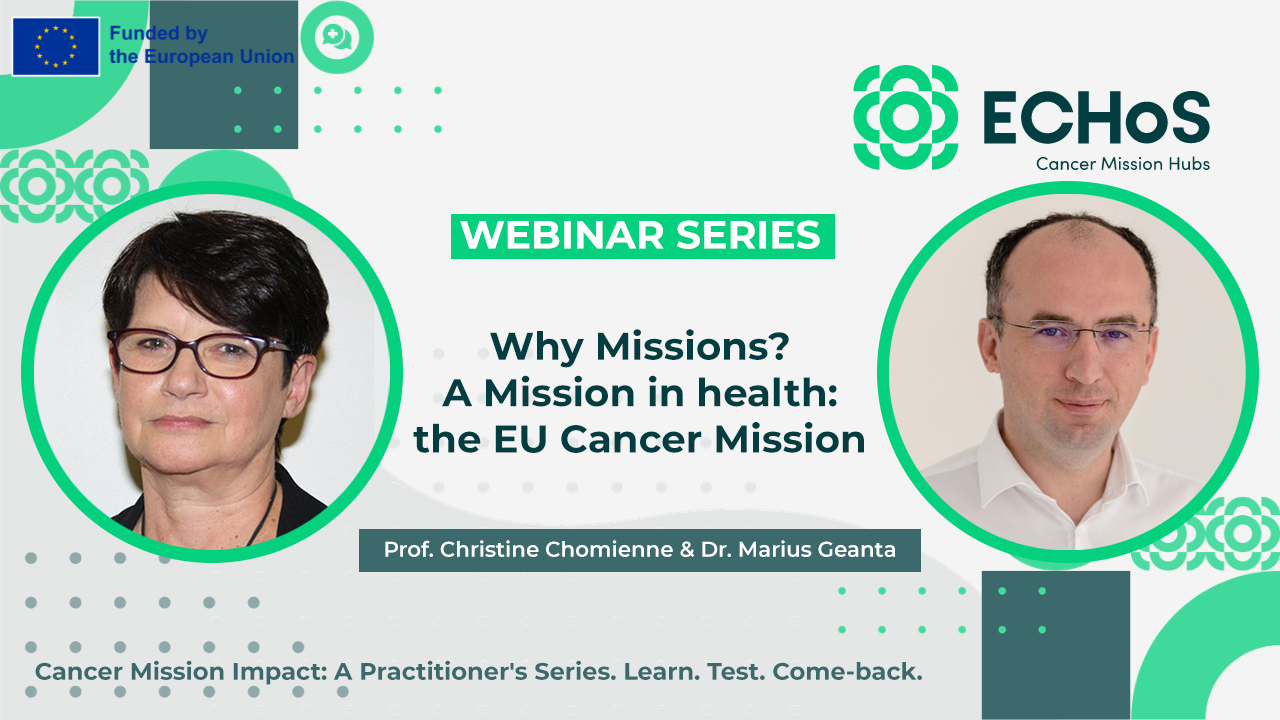Why Missions? A Mission in Health: the EU Cancer Mission
6th June 2024

Watch an insightful webinar on the EU Cancer Mission! Dr. Marius Geanta, in dialogue with a key speaker – Prof. Christine Chomienne. Learn about the mission’s goals to improve cancer understanding, optimize treatments, and enhance the quality of life for patients and caregivers. “It’s not just about reaching targets but ensuring that the journey there is aligned with the needs and expectations of our citizens.” – Prof. Christine Chomienne.
Introduction
The webinar opened with Dr. Marius Geanta providing an overview of the EU Cancer Mission’s goals and introducing the session’s main speaker, Prof. Christine Chomienne. The webinar aimed to delve into the origins, implementation strategies, and future prospects of the EU Cancer Mission, emphasizing the role of citizen and stakeholder engagement in research and policy-making.
Prof. Christine Chomienne’s Presentation
Prof. Chomienne began her presentation by outlining the rationale behind the European Commission’s initiative to establish mission-oriented research and innovation frameworks. She explained that the missions aim to make scientific research more impactful and comprehensible to citizens, fostering greater public involvement and ensuring that research aligns more closely with societal needs.
“Missions provide a solution, an opportunity, and an approach to address the numerous challenges that people face in their daily lives. It’s about involving citizens and stakeholders in setting research priorities and linking these to policy actions, ensuring equal access for everyone in Europe to the best of European innovation and research resources.” – Prof. Christine Chomienne
The EU Cancer Mission’s Objectives and Implementation
Prof. Chomienne detailed the specific objectives of the EU Cancer Mission, which include improving the understanding of cancer, optimizing diagnostics and treatments, and enhancing the quality of life for patients and their caregivers. She emphasized the mission’s holistic approach, which seeks not only to extend life but also to improve the quality of life.
“We aim to save lives, but we also want our citizens and patients to live better lives. This dual focus is crucial to the mission’s approach, integrating prevention, treatment, and support seamlessly.” – Prof. Christine Chomienne
Engaging Citizens in Cancer Research
A significant portion of Prof. Chomienne’s talk was dedicated to the importance of engaging citizens and patients in the research process. She highlighted several initiatives like the European Cancer Patient Digital Center, designed to empower patients by providing them with access to their data and involving them in research activities.
“The platform represents a paradigm shift in how we handle cancer research data, breaking down silos and ensuring that patients are not just subjects but active participants in the research that affects them.” – Prof. Christine Chomienne
Challenges and Future Directions
Despite the ambitious goals of the EU Cancer Mission, Prof. Chomienne acknowledged the challenges in implementation, particularly the need for better integration of research activities across disciplines and sectors. She stressed the importance of establishing effective indicators for measuring the mission’s impact and adjusting strategies based on stakeholder feedback.
“Transformative actions require time, and part of our challenge is to find the right metrics to gauge our progress effectively and inclusively. It’s not just about reaching targets but ensuring that the journey there is aligned with the needs and expectations of our citizens.” – Prof. Christine Chomienne
Discussion and Questions
The floor was then opened for questions, which focused on clarifying the relationship between the EU Cancer Mission and broader EU health policies, and how these initiatives complement each other. Prof. Chomienne and Dr. Geanta discussed the importance of policy support in implementing research findings and the crucial role of ongoing stakeholder engagement.
The webinar concluded with a call to action for all stakeholders involved in the EU Cancer Mission to embrace a collaborative and patient-centered approach to cancer research and treatment. Prof. Chomienne’s insights underscored the potential of the EU Cancer Mission to not only advance scientific understanding and treatment of cancer but also to transform the way research and healthcare systems interact with and involve citizens.
“We are at a turning point where our actions today will define the trajectory of cancer treatment and research in Europe. The mission is not just about cancer; it’s about setting a new standard for how we tackle all health challenges going forward.” – Prof. Christine Chomienne